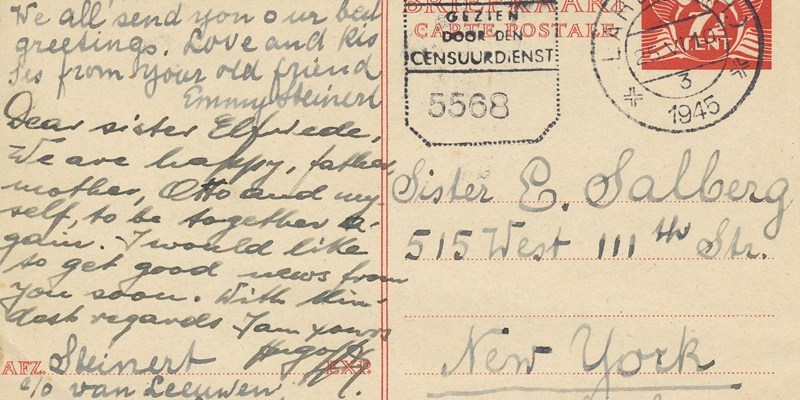A Dundee historian and writer hopes The Courier can add the final chapter to an extraordinary second world war story.
Norman Watson has unearthed a postcard in which a family’s remarkable survival in wartime Europe unfolds.
The card’s message offers a parallel to the poignant story of Anne Frank, who gained international fame posthumously following the publication of her diary, in which she documented her experiences while in hiding in German-occupied Amsterdam.
Norman’s card was sent from Holland to America in June 1945, a month after the end of the war in Europe.
It was posted in the small town of Bussum, about 20 miles from Amsterdam, and addressed to a Sister Elfriede Salberg in New York.
The card is signed Emmy Steinert. The story she relates to Salberg, written in English, underlines the harrowing treatment of Jews during the second world war.
It also suggests that she was in hiding at the same time as Anne Frank, whose diary is now one of the world’s most widely read books. Like Anne, Emmy and her family were probably trapped in Holland as a result of the German occupation there in 1940.
Emmy begins:
“Dear Sister Elfriede,
“It is only today 21st June 1945 that I found back your address.
“We lost nearly all our things, but we are marvellously still alive and that is the principal thing.
“Emile, Hugo, Otto and I. We kept us nearly three years in hiding. The expression here is ‘under water’. We had to flee several times, Emil and I were together and the boys had an other hiding place.’Beastly murderers'”Good sacrificially friends helped us to escape from the hands of these beastly murderers.
“We have had awful years, but not to compare with what our family and friends had to suffer in Poland, where our Paul died too. My mother died in October 1941, and I am so glad that she never knew where we had to pass through.”
Emmy’s account of her experience hints at the terrible suffering of civilian populations during the second world war.
She talks of her mother dying and perhaps she perished in imprisonment as Anne Frank’s own mother did.
The front of the postcard also shows a brief message from Hugo to Sister Salberg which reveals that he and his brother Otto and their parents had survived.’The boys’This suggests that “the boys,” as Emmy called them, were not her siblings, and that they were perhaps cousins or friends.
“Anne Frank concealed herself in hidden rooms in her father’s office as the persecution of the Jewish population increased,” said Norman.
“Emmy doesn’t say where she hid, but uses the term ‘under water’, which I have never come across before. This suggests temporary hiding places, perhaps a secret annexe like Anne.”
Emmy ends her message:
“How are you dear Sister Elfriede and how is your family? I hope to hear soon from you. We are without news from our family and friends who were deported to Poland.
“We all send you our best greetings, love and kisses from your old friend.
“Emmy Steinert.”
Anne Frank was eventually betrayed and sent to a concentration camp, where she died of typhus in 1945, just before Emmy’s postcard was sent.
It is certain that Emmy and her family would have dreaded such a discovery and the inevitable frogmarch to the Dutch Theatre in the Jewish Quarter of Amsterdam which became a deportation centre. Here, Jewish men, women and children gathered to await transfer to Nazi death camps.
But some Dutch citizens sheltered Jews, thereby exposing themselves to great personal danger and their families to the high risk of being imprisoned.
It is intriguing that Emmy writes in 1945 under the care of a Dutch family, the Van Leeuwens in Bussum, who had perhaps protected her during the war, or were members of the partisans.
“There is the intriguing thought that the girls could have known each other,” added Norman.
“Was she, like Anne, forced to wear a yellow star to denote her Jewishness, ordered to surrender her bicycle and forbidden to play in the street? But at least Emmy’s story had a happier ending.
“I have tried to discover what happened to Emmy Steinert and Elfriede Salberg. Alas, I have come up with a blank, even after trawling internet sites.
“Emmy’s is a remarkable story, though, and she must have been very lucky indeed to survive the war. We can only imagine the terror she faced having to ‘flee’ several times, and the prospect of discovery must have been an enormous burden.
“It would be fascinating to learn more about her.”
